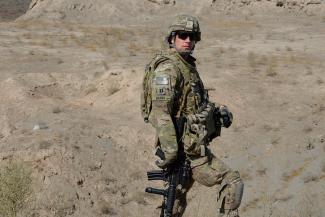
Nicholas Barry joined Texas ECE in 2020 as a PhD candidate under the supervision of Dr. Surya Santoso. Prior to that he spent 16 years in the US Army. We sat down with Nicholas to more about how his service influences his academic career.
Tell me a little about your time in the Army.
I have spent the last 16 years as an engineer officer in the Army. I deployed to Iraq where I served as a Task Force construction officer. I traveled all over the country designing and building engineering projects. Everything from roads to fortifications and even once a dam. Later, I commanded an engineer company in Northern Afghanistan, where we secured a border crossing and partnered with the Afghan Border Police. After going to graduate school for electrical engineering at Rensselaer Polytechnic Institute, I taught for a few years at West Point in the Department of Electrical Engineering and Computer Science. My last assignment before UT Austin was as an Squadron Executive officer in 3d Cavalry Regiment at Fort Hood.
Tell me a little about your PhD work.
My focus is on enhancing the resilience of military microgrids. My current research involves optimization for the design and operation of permanently isolated nanogrids and microgrids, improving resilience in military electrical systems through virtual islanding and resilience assessment techniques for microgrids. I am committed to helping prepare the Army for the numerous implications of the electrification of warfare. My advisor is Dr. Surya Santoso and I started the PhD program in Fall of 2020.
Why did you decide to serve in the Army?
I choose the Army for the opportunity and the experiences that it offered. West Point is a phenomenal educational institute which offered and unrivaled experience, leadership development, and education. I was also interested in exploring the world. I stayed in the Army because I enjoyed the people, the challenges of leadership, the unique nature of the work, and exploring the world.
Tell me about someone who has had a major influence in your life.
My parents; they taught me the value of hard work and education.
What are your future goals?
When I graduate this spring, I will be reassigned to the United States Military Academy at West Point to work as an assistant professor in the Department of Electrical Engineering and Computer Science. I plan to complete for higher level leadership positions in that department as well as work towards becoming a full professor. Beyond that, I am not sure yet…
I imagine after serving 16 years in the Army, you are a little older than the traditional PhD student?
Absolutely correct. I tend to have a different perspective from many of my peers who are much younger. I view this as a positive impact. It brings diversity of experience to the lab group. Often the younger students have a deeper technical understanding, but lack real work experience. Working together we produce higher quality work.
How did serving in the Army help prepare you for academic work and research?
The Army taught me planning, resilience, and discipline. These are all essential for successful academic work and research. It also taught me the importance of team work in the face of challenges. My experience in the Army also helped focus my research. My Army experiences demonstrated the importance and challenges of electrical systems operating in austere environments. These experiences informed and motivated my research work to enhance the resilience of Army electrical systems.
